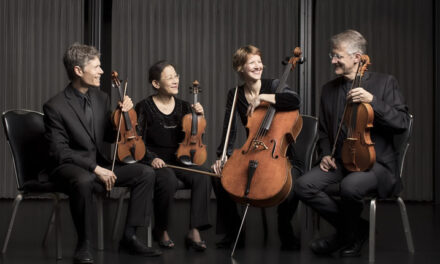Last season, The ArtsCenter presented an evening of 10-minute plays under the rubric Ten by Ten in the Triangle. The number of submissions for this festival were so great (some 500-odd entrants, not all of them by American playwrights) that the omnibus show’s producer Lynden Harris recently gave us a sequel of sorts.
While I must admit that Ten by Ten in the Triangle deepened my appreciation for a form I previously had little use for, the new edition suggested that the judges had it right — or nearly right — the first time. With a few exceptions, the majority of the plays comprising Shorts in Winter: Love UnCovered (Feb. 5-14 at The ArtsCenter in Carrboro, NC) were considerably less interesting and accomplished than were their predecessors.
The acting, like the direction, was erratic. Kenneth Hinton was out of his depth, David Hudson was negligible, David Klionsky veered from under-to-over playing, and Kendall Rileigh performed well, but often only from the neck up. Larry Evans, Candice Churilla, Leila Keen, and Chris Chiron did better, often with less-than-ideal material. Barbette Hunter rose to her considerable best in the more successful pieces, and Jill Greeson was a positive revelation. Thomas “TeKay” King did admirably by the plays he mounted and occasionally better still, whereas Madeline Pabis’ work was superlative. Poor direction stymied some of the plays, none more than Wade Ferguson Dansby’s of “His and Hers,” in which some crucial partial-nudity was arrived at by torturous blocking and unmotivated movement.
Mike Folie’s “Perp,” with slight alterations for profanity, would not have been out of place as a “Saturday Night Live” sketch. I do not mean that as a compliment. “Make It Up” by Judy Klass traded a witty critique of show business sexism for glib dialogue and slapstick, faux-violent climax. The WASP wife of Sheryle Criswell’s “His and Hers” was little more than a pallid cliché. But the Jewish husband — gratingly overplayed by David Klionsky — was a true horror, a stereotype so gross he might have sprung not from the pen of a Jewish playwright but the mind of a Gentile bigot. Tom Stephen’s “May Tag” was an artificial exercise lumbered with self-consciously “poetic” flights of rhetorical fancy.
In “Smoldering Embers,” Robin Armstrong provided muscular theatrical dialogue for the newly widowed wife of a congenital philanderer, but her ending wallowed in the trite (and unbelievable). The most ambitious of the plays was also the most pretentious. Jonathan Karpinos’ “Ritual Feast” posited two couples, each member describing to the audience the events leading to, and ending with, an annual dinner party in first person. A clever idea, perhaps, but after even a few brief minutes the sheer monotony of “I argue,” “I suggest,” “I assert,” “I become,” and “I point out” was beyond wearying.
In Eric Appleton’s “This Tunnel” an effective two-character meditation on the subtle ways in which the personas of adult children grow into those of their parents was fatally marred by a deus ex machina ending; “Surprise” by Mark Harvey Levine, in which an oddly limited psychic faces the expected rejection of his girl-friend, was amusing if paper-thin.
Of the remaining pieces, only three were wholly satisfying. In Kato McNickle’s “Swimming in the Ocean,” a young woman enters a kind of fugue state in which she makes the ghost of her dead sister over to suit her image of events. In its meaty brevity, McNickle’s play got at something essential: the painful means by which we must let go of the dead and absolve ourselves of responsibility for them.
Two comic pieces, both featuring the beautiful and dazzling Jill Greeson, walked away with top honors, each aided immeasurably by the actor’s acutely observed reality and exquisite timing. In “Cupid’s Beau” by Babs Lindsay, Greeson was sheer perfection as an ersatz erotic tease testing the marriage of a college instructor (nicely under-played by the variable David Klionsky.)
Kelly Younger’s “I Think You Think I Love You” was — despite its meaningless title — a comedic tour-de-force that required breathtaking control of the material and, in Greeson, got it. Essentially a long, rambling, and incident-filled monologue by a dutiful daughter about her attempt to dispose not only of her mother’s ashes but that of a feral cat, the play was superbly crafted and often wildly funny. Greeson, who resembles a cross between Sandra Bullock and Julia Roberts but with an adorable quality all her own, gave an astonishing performance, rattling off the daughter’s peripatetic speeches as if the thoughts had just occurred to her — exactly what the critics used to praise in Ellen Terry. Seldom is a playwright this well served by an actor. Both Younger and Greeson are names to remember, and with enormous pleasure.
Second Opinion: Raleigh, NC News & Observer correspondent Roy C. Dicks’ Feb. 13 review: http://www.triangle.com/calendar/theaterreview/story/993632p-6990532c.html.
The ArtsCenter Theater Programs: http://www.artscenterlive.org/theater.html.











